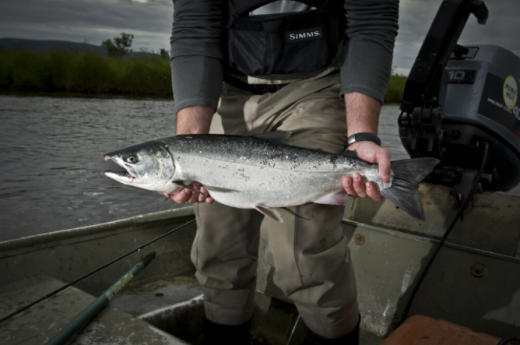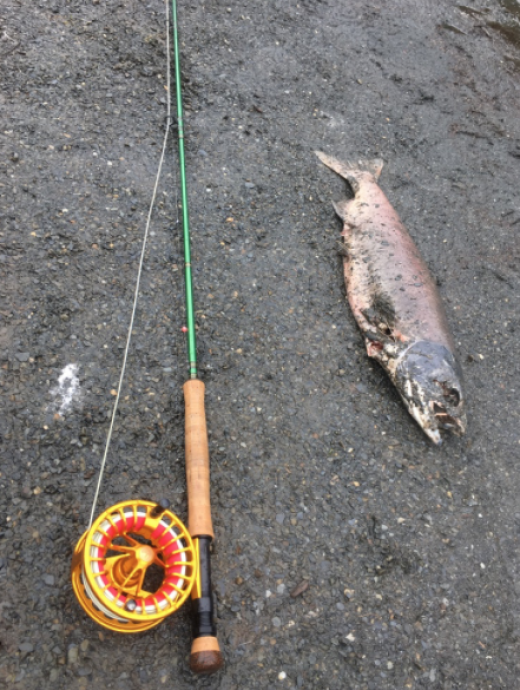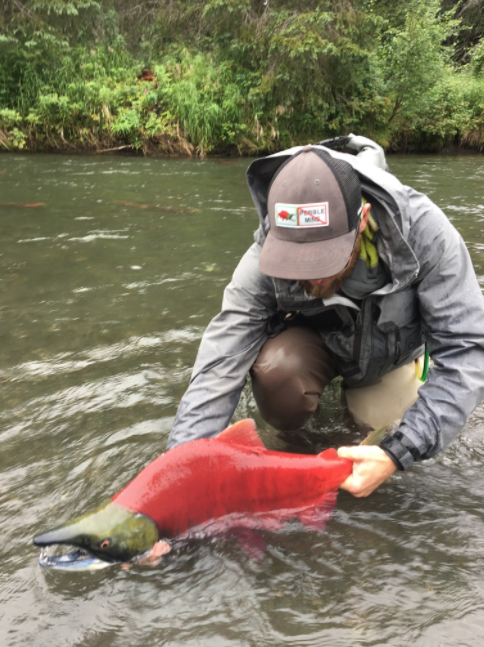By Eric Booton
Chrome.
Silver.
Red gold.
 All the worthy descriptions of fresh, wild Alaska salmon imply monetary value, and for good reason. Here in Alaska, wild salmon attract tourists from around the world. These trusted fish provide employment for guides, commercial fishermen, processors, chefs, pilots and many others. In the final frontier, salmon, fortunately, still return in numbers that allow us trout bums to harvest an amount we deem acceptable without feeling bad about it. A trip to the river can save a trip to the grocery store and the product is in most cases much healthier.
All the worthy descriptions of fresh, wild Alaska salmon imply monetary value, and for good reason. Here in Alaska, wild salmon attract tourists from around the world. These trusted fish provide employment for guides, commercial fishermen, processors, chefs, pilots and many others. In the final frontier, salmon, fortunately, still return in numbers that allow us trout bums to harvest an amount we deem acceptable without feeling bad about it. A trip to the river can save a trip to the grocery store and the product is in most cases much healthier.
Over the past few fishing trips I have noticed a large shift in the use of descriptors for these beloved fish. Time is beginning to take its toll on the swimming migrants who have returned to sacrifice themselves for the next generation. You can see it. You can hear it. And my God you can smell it.
The perceived value of salmon changes in mere weeks. The silver bullet that previously equated to cold, hard cash or scrumptious sustenance for the dark days of winter is losing its luster to we picky homo sapiens. What was once a grey ghost haunting the depths of pools is now all too easily spotted as spawning colors are in full bloom. Sleek profiles resembling torpedos have been replaced with large humps and impressive kypes. The ways in which these species change still baffles me, and always will.
The spawning or spawned out sockeyes that signal stellar trout fishing begin to lose their steam. These swimming tomatoes that are beginning to struggle to hold their place in the water are notorious for taking your egg pattern and breaking off when they chose to run at the last second after having spent a minute or two being reeled in like a wet towel.
 “Please don’t break my leader again,” I think to myself while trying to gently net a near moldy salmon. You came, you spawned, now your duty is done…
“Please don’t break my leader again,” I think to myself while trying to gently net a near moldy salmon. You came, you spawned, now your duty is done…
Well, not quite.
They may no longer be of appetite to us bipedal beings, but a bear will still take a bite out of it. Birds plan to pick them bare for sustenance. The trout you chase intend to feast on their flesh when it rots away and falls off the bone. And the trees that provide habitat and shelter you from the elements will gladly suck up the remaining nutrients.
Yes, they are officially of less value to your pocket book, but immense value still remains in the nutrients of the dying or deceased. It’s what turns one simple fish into a keystone species for Alaska and the Pacific Northwest. It’s what makes salmon so important, so worthy of protecting. Help protect salmon in Alaska today. Submit your commit to the Environmental Protection Agency and tell them to keep protections for Bristol Bay.
Eric Booton is the sportsmen’s outreach coordinator for TU’s Alaska Program.



